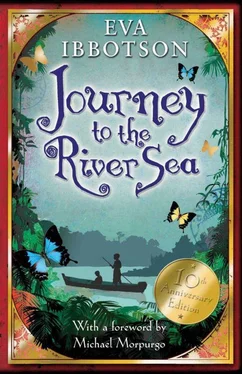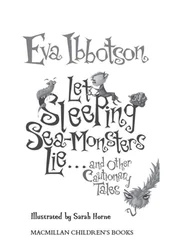Maia went ahead into the big room with its tall windows and barre . It was full of chattering, swirling children, waiting for Madame Duchamp. An old lady with mottled hands sat at the piano, absently touching the keys.
A tall Russian boy with red hair came over and introduced himself. ‘I’m Sergei,’ he said with a friendly smile. ‘And this is my sister Olga.’
Maia put out her hand. ‘I’m Maia. I’m staying with the Carters.’
‘Yes, we heard.’
A sunny-looking Austrian girl with plaits around her head came to join them. This was Netta Haltmann, the daughter of the twins’ piano teacher. Maia was usually shy with new people, but the relief of seeing all these ordinary, welcoming children was overwhelming and she was soon chattering in the same mixture of languages that the other children used. She had not realized that every word she spoke to the twins had to be thought about and weighed.
Madame Duchamp now entered; an elegant French woman of about fifty with a black bun skewered high on her head.
‘So, now we are ready. Find a space and point the toe, please.’
Maia’s toe was already pointed. She loved to dance. The old woman at the piano began to play a Chopin waltz.
While the children danced, the governesses and the nursemaids sat on chairs round the wall.
‘Is that the little cousin who comes to live with the Carters?’ said a friendly-looking, plump lady on Miss Minton’s left, and introduced herself. ‘I am Mademoiselle Lille, the governess of the Keminskys — Sergei and Olga.’
‘Yes, that’s Maia,’ said Miss Minton.
‘She is charming. So graceful.’
‘Yes, she is a good child,’ said Miss Minton.
Mademoiselle Lille looked at her from under arched eyebrows. ‘And of course the twins,’ she added politely. ‘They are always so tidy… so clean…’
Both women watched the two stolid girls, revolving as relentlessly as metronomes to the music.
‘Yes… it is difficult for them,’ said Miss Minton. ‘They have not been used to having other children.’
‘But now your Maia is happy,’ said Mademoiselle Lille who seemed to know a little too much about life at the Carters. ‘How musical she is! She and the little Netta and my Sergei also. You must bring her to visit us. The countess is always wanting that her children meet new friends.’
The music stopped.
‘Now you will take partners,’ said Madame Duchamp.
Maia looked down at the floor. There were more girls than boys; she would wait and dance with whoever was left over. A Portuguese boy with a rose in his buttonhole claimed Netta. Then she found that Sergei was at her side.
‘Will you?’ he said. And she nodded happily, to see the twins watching her balefully before they turned to each other.
‘They always dance together,’ explained Sergei. ‘I don’t think they like other children.’
Maia was not so sure. ‘Perhaps next time you can ask one of them.’
‘No! They make me frightened,’ he said, and laughed.
It was a wonderful hour. The shabby old lady had played for the Imperial Russian Ballet School; she coaxed real music out of the battered piano. Maia forgot the twins, forgot the dark and gloomy house — and danced.
But five minutes before the end of the lesson, something happened which changed her mood completely.
Two men came into the room. They were dressed in black: black trousers, black jacket, black shoes, and as they walked over to Madame Duchamp, it was as though a pair of gloomy crows had stalked into the room.
The larger of the crows put up his hand; the piano fell silent. Then both men approached Madame Duchamp and spoke to her in a low voice.
Maia could not hear what they were saying but she felt a shiver of unease, and when she looked at Miss Minton, she saw that her governess was frowning.
‘I know nothing of such a boy,’ said Madame Duchamp firmly. ‘Nothing.’
The men spoke again and when she nodded they turned to the class.
‘Now, please listen very carefully,’ said the taller of the crows, as though he was speaking to a group of two year olds. He had a square forehead and a bulbous nose covered in broken veins. ‘My name is Trapwood and my partner here is Mr Low, and we’ve come to Manaus on an important mission. A very important mission. We have come to find a boy who is living somewhere near here and who must be brought back to England.’
Mr Low, the thinner, smaller crow, blinked his watery eyes and nodded. ‘Must be brought back,’ he repeated in a high voice. ‘Quickly. Must be taken back without delay.’
‘The boy is the son of an Englishman called Bernard Taverner who settled out here and who is now dead,’ Mr Trapwood went on. ‘He was drowned when his canoe overturned in the rapids. Now, does anyone here know such a boy?’
The children looked at each other. Those that spoke English translated what the crows had said into other languages, and everybody shook their heads.
‘What does he look like?’ asked a tall girl.
‘We don’t know. Nor do we know his first name. But he must be found.’
Mr Low was getting agitated; his voice had risen to an even higher squeak.
Still the children shook their heads.
‘Well, if you see anything unusual, anything at all — or if anything occurs to you later that makes you think you know where he might be found, you must go at once to the police station. Do you understand me?’ said Mr Trapwood, who seemed to think that the children had lost their wits. ‘Or you can come to the Pension Maria and ask for Mr Trapwood and Mr Low.’
‘What has he done?’ asked a brave child, the son of the customs officer.
‘That is neither here nor there,’ said the taller crow. ‘But he must be found and he must be taken back to England. There might be good news — if it is the right boy,’ he said. He tried to smile but could only manage a sinister leer. ‘We will be offering a reward,’ he added in an oily voice. ‘And remember, anyone hiding such a boy would be guilty of interfering with the law.’
‘Which means he could be locked up. Or she. They could be put in prison,’ squeaked Mr Low.
They left then, and Madame Duchamp called for a final polka, but the lightness had gone out of the day.
Sergei knew about the crows. ‘They arrived yesterday on the mail boat and they’ve been prowling round ever since, asking questions,’ he said.
‘I ’ope they do not catch ’im,’ said Netta.
Maia hoped so too, she hoped so very much indeed. To be found by Mr Low and Mr Trapwood and be dragged back to England seemed to her a most horrible fate.
After the dancing class, the twins and Mrs Carter went off to shop and have lunch before their piano lessons in the afternoon. Since the time for Maia’s lesson had not yet been fixed, Mrs Carter gave permission for Miss Minton and Maia to wander around Manaus on their own.
‘You will of course not go into any place where they serve Native Food,’ she told Miss Minton, and Miss Minton said, ‘No, Mrs Carter’, and did not bother to point out that since the Carters had not paid her yet, she could hardly afford to buy Maia a banana, let alone give her lunch in a restaurant.
But they had a lovely time. It had rained earlier, but now a fresh breeze blew from the river and wherever they looked there was something to interest them: a howler monkey sitting on a telegraph pole outside the post office; a cluster of brilliant yellow butterflies drinking from the water troughs put out for the horses, a pint-sized child lugging a mule on a rope. Maia bought some postcards to send to her friends, and asked Miss Minton if she would like one to send to her sister, but Miss Minton said her sister thought postcards were vulgar so she could do without.
Читать дальше












